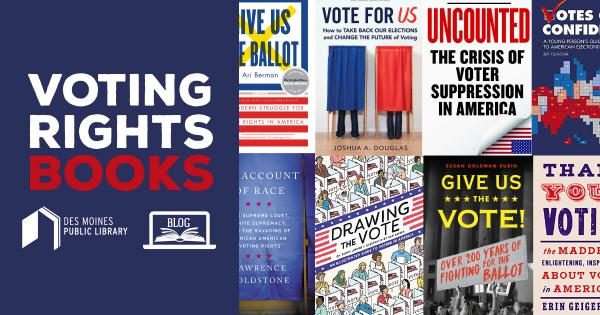
Voting is one of the most meaningful ways you can express yourself and your opinions in a democracy. Unfortunately, this right has not always been given in equal measures in America. Listed below are books for people of all ages that describe the struggle fair and equal voting rights, past and present, as well as ways you can ensure your own voting rights are enshrined both now and in the future.
The library is hosting a special Zoom program next Thursday, September 24, about voting rights in Iowa. You must register to take part. You can do so at dmpl.org/events. The program is free!
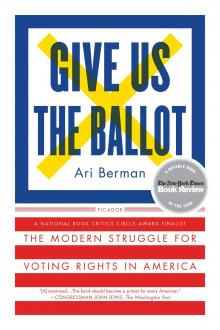
'Give us the Ballot: The Modern Struggle for Voting Rights in America,' by Ari Berman
Countless books have been written about the civil rights movement, but far less attention has been paid to what happened after the dramatic passage of the Voting Rights Act (VRA) in 1965 and the turbulent forces it unleashed. Give Us the Ballot tells this story for the first time.
In this groundbreaking narrative history, Ari Berman charts both the transformation of American democracy under the VRA and the counterrevolution that has sought to limit voting rights, from 1965 to the present day. The act enfranchised millions of Americans and is widely regarded as the crowning achievement of the civil rights movement. And yet, fifty years later, we are still fighting heated battles over race, representation, and political power, with lawmakers devising new strategies to keep minorities out of the voting booth and with the Supreme Court declaring a key part of the Voting Rights Act unconstitutional.
Berman brings the struggle over voting rights to life through meticulous archival research, in-depth interviews with major figures in the debate, and incisive on-the-ground reporting. In vivid prose, he takes the reader from the demonstrations of the civil rights era to the halls of Congress to the chambers of the Supreme Court. At this important moment in history,Give Us the Ballot provides new insight into one of the most vital political and civil rights issues of our time.
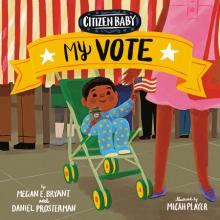
'My Vote,' by Megan Bryant
Citizen Baby knows a thing or two about voting. It's important to meet the candidates (they love babies!) and to call voters. Plus, you get a sticker at the polls! Children and adults alike will enjoy learning about voting in this adorable, informative board book.
The Citizen Baby series is a joyful, nonpartisan celebration of American democracy that explores how everyday families engage.

'Uncounted: The Crisis of Voter Suppression in the United States,' by Gilda R. Daniels
An answer to the assault on voting rights―crucial reading in advance of the 2020 presidential election
Uncounted examines the phenomenon of disenfranchisement through the lens of history, race, law, and the democratic process. Gilda R. Daniels, who served as Deputy Chief in the United States Department of Justice Civil Rights Division and more than two decades of voting rights experience, argues that voter suppression works in cycles, constantly adapting and finding new ways to hinder access for an exponentially growing minority population. She warns that a premeditated strategy of restrictive laws and deceptive practices has taken root and is eroding the very basis of American democracy―the right to vote!
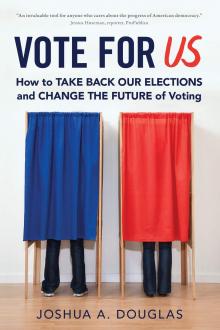
'Vote for US: How to Take Back Our Elections and Change the Future of Voting,' by Joshua Douglas
In contrast to the anxiety surrounding our voting system, with stories about voter suppression and manipulation, there are actually quite a few positive initiatives toward voting rights reform. Professor Joshua A. Douglas, an expert on our electoral system, examines these encouraging developments in this inspiring book about how regular Americans are working to take back their democracy, one community at a time. Told through the narratives of those working on positive voting rights reforms, Douglas includes chapters on expanding voter eligibility, easing voter registration rules, making voting more convenient, enhancing accessibility at the polls, providing voters with more choices, finding ways to comply with voter ID rules, giving redistricting back to the voters, pushing back on big money through local and state efforts, using journalism to make the system more accountable, and improving civics education. At the end, the book includes an appendix that lists organizations all over the country working on these efforts. Unusually accessible for a lay audience and thoroughly researched, this book gives anyone fed up with our current political environment the ideas and tools necessary to affect change in their own communities.
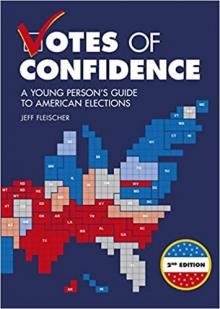
'Votes of Confidence: A Young Person's Guide to American Elections,' by Jeff Fleischer
Every two years, media coverage of American elections turns into a horse-race story about who's leading the polls and who said what when. Give young adult readers clear explanations about how our election process actually works, why it matters, and how they can become involved. Using real-world examples and anecdotes, this book provides readers with thorough, nonpartisan explanations about primaries, the electoral college, checks and balances, polls, fundraising, and more. Updated with statistics and details from the 2018 elections, the revised second edition will prepare the next generation of voters for what is sure to be a fascinating 2020 election cycle.
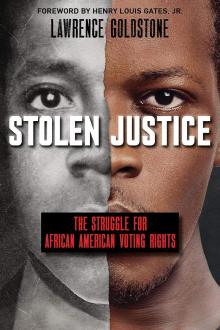
'Stolen Justice: The Struggle for African American Voting Rights,' by Lawrence Goldstone
A thrilling and incisive examination of the post-Reconstruction era struggle for and suppression of African American voting rights in the United States.
Following the Civil War, the Reconstruction era raised a new question to those in power in the US: Should African Americans, so many of them former slaves, be granted the right to vote?
In a bitter partisan fight over the legislature and Constitution, the answer eventually became yes, though only after two constitutional amendments, two Reconstruction Acts, two Civil Rights Acts, three Enforcement Acts, the impeachment of a president, and an army of occupation. Yet, even that was not enough to ensure that African American voices would be heard, or their lives protected. White supremacists loudly and intentionally prevented black Americans from voting -- and they were willing to kill to do so.
In this vivid portrait of the systematic suppression of the African American vote, critically acclaimed author Lawrence Goldstone traces the injustices of the post-Reconstruction era through the eyes of incredible individuals, both heroic and barbaric, and examines the legal cases that made the Supreme Court a partner of white supremacists in the rise of Jim Crow. Though this is a story of America's past, Goldstone brilliantly draws direct links to today's creeping threats to suffrage in this important and, alas, timely book.
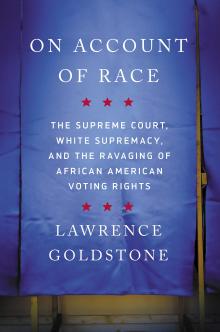
'On Account of Race: the Supreme Court, White Supremacy, and the Ravaging of African American Voting Rights,' by Lawrence Goldstone
An award-winning constitutional law historian examines case-based evidence of the court's longstanding support for white supremacy (often under the guise of "states rights") to reveal how that bias has allowed the court to solidify its position as arguably the most powerful branch of the federal government.
One promise of democracy is the right of every citizen to vote. And yet, from our founding, strong political forces were determined to limit that right. The Supreme Court, Alexander Hamilton wrote, would protect the weak against this very sort of tyranny. Still, as On Account of Race forcefully demonstrates, through the better part of American history the Court has instead been a protector of white rule. And complex threats against the right to vote persist even today.
Beginning in 1876, the Supreme Court systematically dismantled both the equal protection guarantees of the Fourteenth Amendment and what seemed to be the right to vote in the Fifteenth. And so a half million African Americans across the South who had risked their lives and property to be allowed to cast ballots were stricken from voting rolls by white supremacists. This vacuum allowed for the rise of Jim Crow. None of this was done in the shadows--those determined to wrest the vote from black Americans could not have been more boastful in either intent or execution.
On Account of Race tells the story of an American tragedy, the only occasion in United States history in which a group of citizens who had been granted the right to vote then had it stripped away. It is a warning that the right to vote is fragile and must be carefully guarded and actively preserved lest American democracy perish.
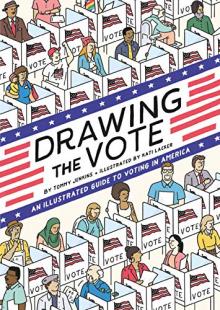
'Drawing the Vote: An Illustrated Guide to Voting in America,' by Tommy Jenkins
How the history of American voting rights has shaped the way we vote today.
Coinciding with the 2020 US presidential election, Drawing the Vote, an original graphic novel, looks at the history of voting rights in the United States and how it affects the way we vote today. Throughout the book, the author, Tommy Jenkins, identifies events and trends that led to the unprecedented results of the 2016 presidential election that left America political parties more estranged than ever. To balance these complex ideas and statistics, Kati Lacker's original artistic style makes the book accessible for readers of all ages. At a time when many citizens are experiencing challenges and apathy about voting and skepticism concerning our bitterly divided political parties, Drawing the Vote seeks to offer some explanation for how we got here and how every American can take action to make their vote count.
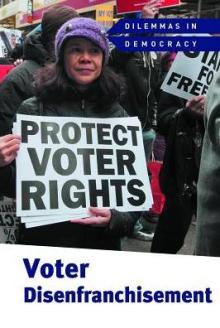
'Voter Disenfranchisement,' by Derek Miller
Voter disenfranchisement occurs when people who have the right to vote are prevented from doing so. Students study its ugly history in the South but rarely learn about worrisome current examples of voter disenfranchisement. African American and Hispanic voters are much more likely to be told that they lack the correct identification to vote, have their names incorrectly removed from voting rolls, or learn that their polling place changed at the last minute. Additionally, individuals with criminal convictions face impediments to their right to vote. Many argue that this constitutes disenfranchisement, with fierce opinions on both sides of the issue. This must-have examines the scope of the problem and discusses recent efforts to stop this violation of civil rights.
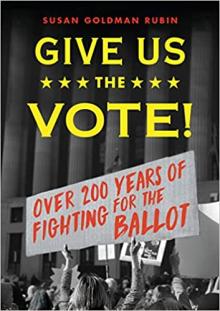
'Give Us the Vote!: Over 200 Years of Fighting for the Ballot,' by Susan Goldman Rubin
The corruption, activism, heroic efforts, and ongoing struggles for the right to vote are chronicled by an award-winning nonfiction author.
For over 200 years, people have marched, gone to jail, risked their lives, and even died trying to get the right to vote in the United States. Others, hungry to acquire or hold onto power, have gone to extraordinary lengths to prevent people from casting ballets or outright stolen votes and sometimes entire elections.
Perfect for students who want to know more about voting rights, this nonfiction book contains an extensive view of suffrage from the Founding Fathers to the 19th Amendment to the Civil Rights Act of 1964 to today's voter suppression controversies, and explains the barriers people of color, Indigenous people, and immigrants face. Back matter includes a bibliography, source notes, texts of the Constitution and amendments, a timeline, and an index.
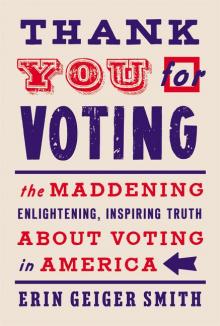
'Thank You for Voting: The Maddening, Elightening, Inspiring Truth about Voting in America,' by Erin Geiger Smith
In this concise, lively look at the past, present, and future of voting, a journalist examines the long and continuing fight for voting equality, why so few Americans today vote, and innovative ways to educate and motivate them; included are checklists of what to do before election day to prepare to vote and encourage others.
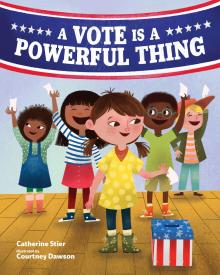
'A Vote is a Powerful Thing', by Catherine Stier
Callie knows there's a presidential election coming up. Her class is having an election, too, about an issue that affects them all--the class field trip! She's about to witness first-hand what a difference a vote can make--even a single vote--and along the way will find out about the election process and why people have fought for the right to vote throughout history. A great kids'-eye look at the power of the vote.

'The Fight to Vote,' by Michael Waldman
From the president of NYU's Brennan Center for Justice and the author of The Second Amendment, the history of the long struggle to win voting rights for all citizens.
In The Second Amendment, Michael Waldman traced the ongoing argument on gun rights from the Bill of Rights to the current day. Now in The Fight to Vote, Michael Waldman takes a succinct and comprehensive look at a crucial American struggle: the drive to define and defend government based on "the consent of the governed." From the beginning, and at every step along the way, as Americans sought to right to vote, others have fought to stop them. This is the first book to trace the full story from the founders' debates to today's challenges: a wave of restrictive voting laws, partisan gerrymanders, the flood of campaign money unleashed by Citizens United. Americans are proud of our democracy. But today that system seems to be under siege, and the right to vote has become the fight to vote.
In fact, that fight has always been at the heart of our national story, and raucous debates over how to expand democracy have always been at the center of American politics. At first only a few property owners could vote. Over two centuries, working class white men, former slaves, women, and finally all Americans won the right to vote. The story goes well beyond voting rules to issues of class, race, political parties, and campaign corruption. It's been raw, rowdy, a fierce, and often rollicking struggle for power. Waldman's The Fight to Vote is a compelling story of our struggle to uphold our most fundamental democratic ideals.
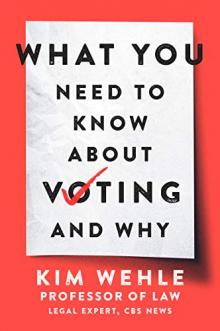
'What You Need to Know About Voting and Why,' by Kim Wehle
Want to change the world? The first step is to exercise your right to vote! In this step by step guide, you can learn everything you need to know.
In What You Need to Know About Voting--and Why, law professor and constitutional scholar Kimberly Wehle offers practical, useful advice on the mechanics of voting and an enlightening survey of its history and future.
- What is a primary?
- How does the electoral college work?
- Who gets to cast a ballot and why?
- How do mail-in ballots work?
- How do I register?
For new voters, would-be voters, young people and all of us looking ahead to the next election, What You Need to Know About Voting--and Why is a timely and informative guide, providing the background you need in order to make informed choices that will shape our shared destiny for decades to come.
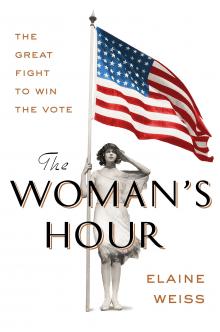
'The Woman's Hour: The Great Fight to Win the Vote,' by Elaine Weiss
Nashville, August 1920. Thirty-five states have ratified the Nineteenth Amendment, twelve have rejected or refused to vote, and one last state is needed. It all comes down to Tennessee, the moment of truth for the suffragists, after a seven-decade crusade. The opposing forces include politicians with careers at stake, liquor companies, railroad magnates, and a lot of racists who don't want black women voting. And then there are the "Antis"--women who oppose their own enfranchisement, fearing suffrage will bring about the moral collapse of the nation. They all converge in a boiling hot summer for a vicious face-off replete with dirty tricks, betrayals and bribes, bigotry, Jack Daniel's, and the Bible.
Following a handful of remarkable women who led their respective forces into battle, along with appearances by Woodrow Wilson, Warren Harding, Frederick Douglass, and Eleanor Roosevelt, The Woman's Hour is an inspiring story of activists winning their own freedom in one of the last campaigns forged in the shadow of the Civil War, and the beginning of the great twentieth-century battles for civil rights.
Last Modified December 14, 2025
Type:
Home Page